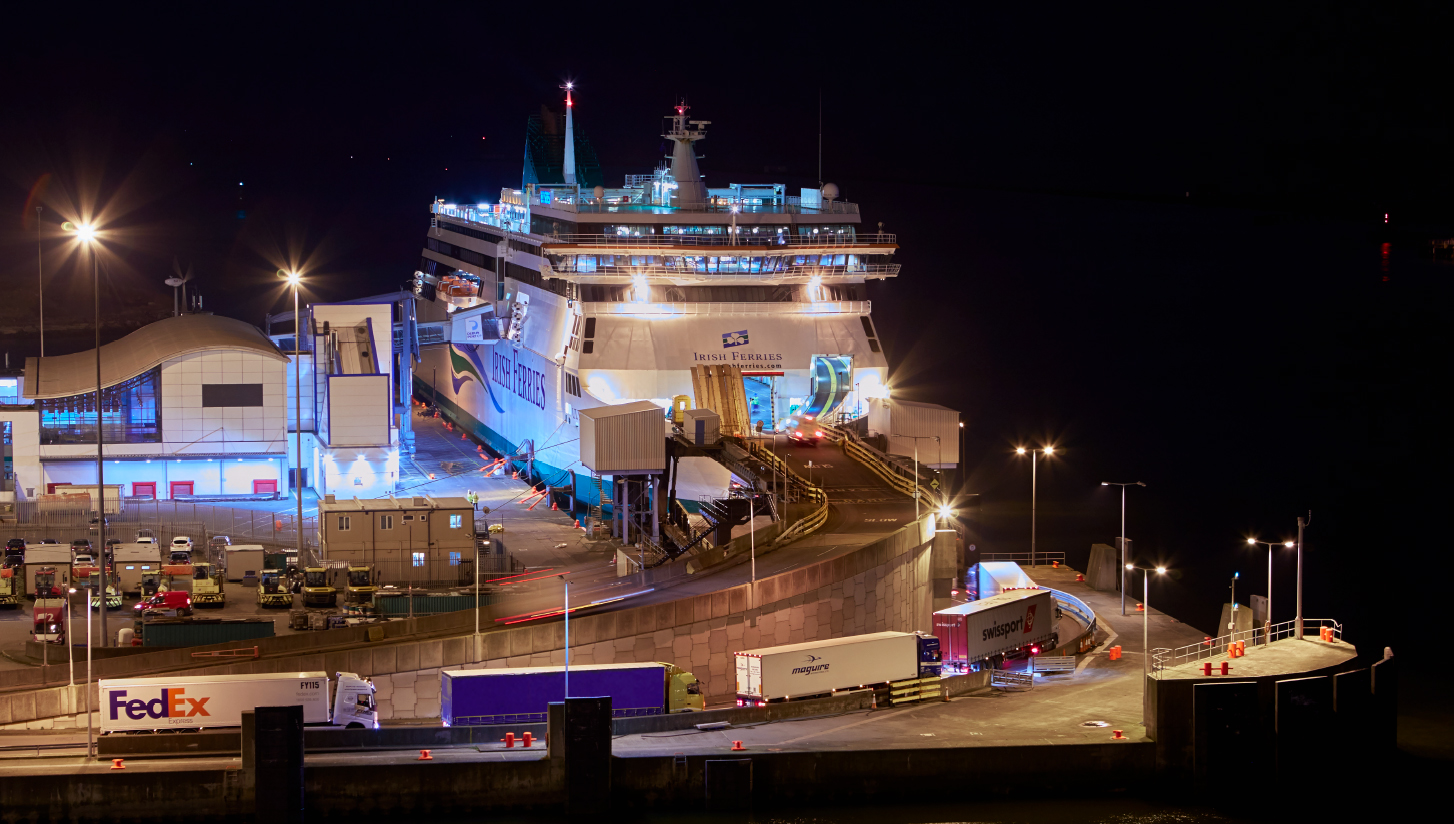
Eamonn Rothwell,
Chief Executive Officer

2021 Performance
2021 was a progressive year for the Group, which saw the expansion of the Group’s ferry services to the Dover – Calais route and continued growth in both our RoRo and LoLo business. Despite the obvious challenges of the Covid-19 pandemic and the resulting travel restrictions, the Group maintained essential shipping links on and off the island of Ireland through operating its conventional ferries. The Group utilised its flexible shipping fleet to ensure it could adjust and service the short-term changes to trade flows following the end of the Brexit transition period.
The Group made a loss before tax of €4.1 million (2020: loss of €18.0 million), at an operating level pre non-trading items a small loss of €0.2 million (2020: profit of €0.8 million) is reported. Operations were cash generative at €56.8 million (2020: €46.1 million) and the Group maintained a strong balance sheet.
The Chairman in his review noted the progress we have made in the strategic development of the Group despite the difficult backdrop in our markets. These include significant environmental investments in both of our divisions and an improvement in our ESG reporting at a Group level.
The performance in the Ferries Division saw a slight increase in EBITDA to €23.2 million (2020: €22.3 million). While the performance is disappointing, we take comfort and encouragement from the division’s ability to introduce significant cost containment measures that ensured it remained profitable at an EBITDA level. This is testament to the division’s underlying cost base.
Performance in the Container and Terminal Division grew at an impressive rate during the year. EBITDA in this division increased by 47.0% to €29.1 million (2020: €19.8 million). This was driven by strong growth in activity levels, with revenue growing by 18.8% to €174.0 million (2020: €146.5 million).
Key Financial Highlights
EBITDA (pre non-trading items)
€52.3m
2020: €42.1m | +24.2%
EBIT (pre non-trading items)
€(0.2)m
2020: €0.8m
Return on average capital
(0.1%)
2020: 0.2% | -0.3pts
Adjusted earnings per share
(2.7)c
2020: (4.3)c | +37.2%
Free cash flow before strategic capital expenditure
€43.3m
2020: €35.3 | +22.7%
Financial Position
The Group ended the year in a strong position financially notwithstanding that equity attributable to shareholders decreased by €16.2 million to €249.7 million. To protect the Group’s already strong liquidity position against the short-term uncertain trading environment, a decision was made not to pay any dividends during 2021 (2020: €nil). During the year, the Group bought back 4.6 million shares which were cancelled. The total consideration paid for these shares was €19.8 million.
Net debt at year end was €142.2 million compared to net debt of €88.5 million in the prior year. This represents a net debt / EBITDA leverage of 2.6 times under banking covenant definitions. The increase in net debt is due to strategic capital expenditure of €41.7 million and share buyback of €19.8 million during the year. Year end net debt of €142.2 million comprised gross borrowings of €123.1 million (2020: €200.4 million), lease obligations of €57.6 million (2020: €38.5 million) less gross cash balances of €38.5 million (2020: €150.4 million). Right-of-use lease obligations are excluded for banking covenant purposes.
Strategic Performance
As Chief Executive, a key responsibility is to drive future profitable and sustainable growth of the Group. I’m happy to report that on a strategic level significant progress was made during 2021 in preparing the Group for future long term growth opportunities.
During the year, the Group commenced Irish Ferries services on the new Dover – Calais route. The services commenced on the 29 June 2021 with the deployment of the Isle of Inishmore. The route was further boosted with the introduction of the Isle of Innisfree onto the route on the 16 December 2021. The Group purchased a third ship for the route to be named the Isle of Inisheer. This ship will enter service onto the route in the first half of 2022. The introduction of a third ship onto the route for Irish Ferries will strengthen our position on the route and ensure we are a viable alternative to the incumbent operators.
In the prior year, the Group was successful in the public tender to operate a container depot at the new Dublin Inland Port. This is an important contract for the Group as we look to expand our container operations in Dublin in the knowledge of the scarcity of space to expand in the core Dublin Port area. It is testament to the quality of our container operations in the Port area that we have been selected as the first tenant of the new Inland Port facility. Operations at this terminal commenced in January 2022.
The Group’s management continually seeks investment opportunities which meet the Group’s stringent return hurdles both in terms of return and risk appetite, a policy which is promoted at all levels within the organisation. These investments are funded through a combination of debt and cash generation from existing activities.
Strategy and the Environment
The Group is conscious that its activities have an environmental impact but is happy to note that reducing that impact aligns with our overall strategy. In the prior year, the Group proceeded with the significant investments in installing exhaust gas cleaning systems (EGCS) and the ongoing program of electrification of heavy plant at our container terminals. Both of these investments, while reducing harmful emissions, also bring health and safety benefits to our operatives and align with the strategic objective of delivering sustained and profitable growth. This investment continued in 2021, including the order of five additional electric cranes for our Dublin Ferryport Terminal. In addition to the continued investment, the Group has this year enhanced our target setting across the organisation, developed a climate risk framework and published for the first time our environmental policy. Details of our work in this space during the year are detailed in our Sustainability and ESG Report at pages 40 to 61.
The Group currently collects various data related to its environmental impact of its operations for external reporting purposes. In recognition of the powerful effect that data can have on creating awareness of individual actions. In the prior year, the Group commenced a program to collate and harness this data as a tool to promote environmental responsibility within the workforce. While we recognise that we still have a way to go, we consider the steps taken over the last number of years as creating the foundation from which we can further develop our approach to sustainability, ESG and strong reporting in the years ahead.
However, for certain aspects the Group will require the shipping sector as a whole to work together. This particularly relates to global regulation under the auspices of the International Maritime Organisation setting common standards and key equipment suppliers adopting the latest technologies. As a small operator in a global market, the Group will only apply proven technologies which generate an economic return. The International Maritime Organisation and the European Union have recently set out decarbonisation goals for the Maritime industry. These are set out in our Sustainability and ESG Report on pages 40 to 61.
The Group is aware that our stakeholders require us to be environmentally focused and the Group is committed to continuous improvement in both the big and small things that we do.
Exit of the United Kingdom from the European Union
With the ending of the transition period on 31 December 2020 following Brexit, customs and other formalities were introduced on freight movements on our routes between Ireland and Britain. However, the long standing Common Travel Area arrangements were retained which allow free movement of passengers between both jurisdictions. The UK has also retained its adherence to the Convention on the Contract for the International Carriage of Goods by Road which facilitates the movement of goods to Continental Europe via the UK. Of concern is the lack of implementation of appropriate checks on goods arriving into Northern Ireland from Britain, which are required under the Northern Ireland Protocol. This creates a distortion in the market, where such checks are applied on goods arriving into Republic of Ireland ports.
The effect of the new formalities during 2021 was to change RoRo freight shipping patterns for goods moving between Ireland and Continental Europe, from the UK landbridge to direct services. In response, with the flexibility of our fleet, we adjusted capacity between our short sea Ireland Britain services and direct Continental services. While this has resulted in a reduction in RoRo volumes, a higher yield mix has maintained revenues at levels marginally behind last year. As our customers have become more familiar with the new checking arrangements, continental flows are returning to the more efficient and weather reliable short sea services.
Following the end of the transition period, Duty Free sales on our sailings into Britain recommenced, following the previous abolition of Duty Free sales in 1999. While early signs are encouraging, until we see a full return to post Covid-19 passenger levels, it will be difficult to judge how beneficial this will be for the Group.
Stakeholders
The Group’s performance is dependent on the support of our customers, suppliers and employees. I would like to thank all our customers for their support during this difficult year. We will continue to work with our customers to meet their expectations into the future.
Our suppliers are key to our ability to deliver quality services to our customers. We continually work with our suppliers whether they be port operators, contracted service providers or product suppliers to improve efficiencies and quality. We appreciate the co-operation and flexibility achieved in delivering our 24/7 services.
As in prior years, I would like to take this opportunity to thank our employees for their continued dedication to the operation of our services that are essential to the island of Ireland. This dedication has never before been so severely tested. It is testament to their dedication and skill that the Group’s services on and off the island were maintained.
Outlook
I look forward in 2022 to a return to normalised levels in our passenger markets with the easing of Covid-19 travel restrictions, the continuation of the trends in 2021 which saw a gradual return of RoRo freight to our short sea Irish Sea routes and the continued growth in our Container and Terminal Division. The introduction of a third vessel onto our Dover – Calais service will give us an excellent platform to continue to grow and firmly establish ourselves on the new route. As in prior years, we will continue to seek out improvement and investment opportunities for our longer-term success.
Eamonn Rothwell,
Chief Executive Officer
9 March 2022